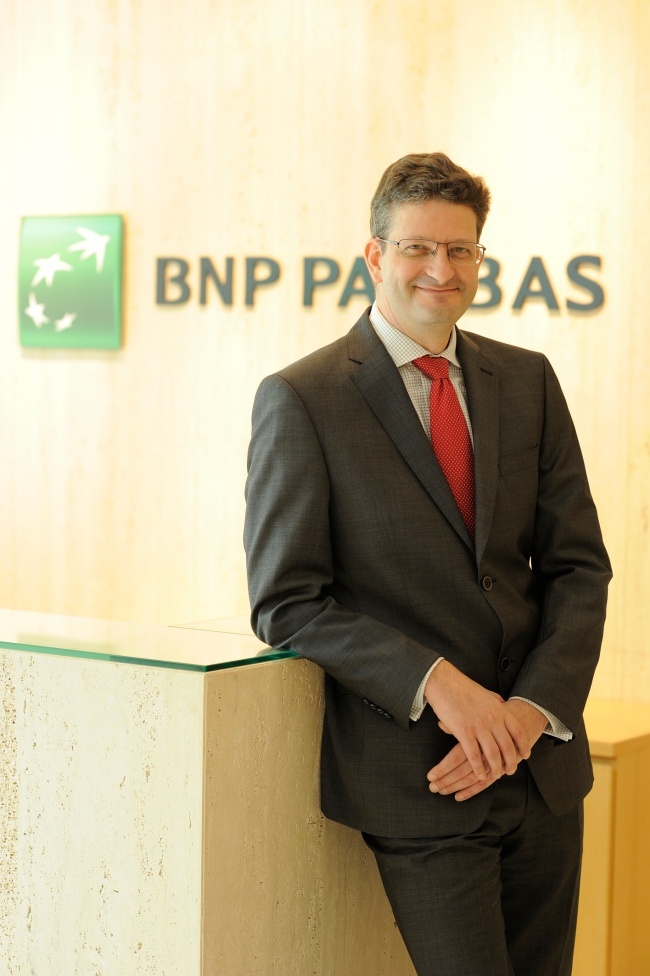[INTERVIEW] BNP Paribas head says Korean economy ‘cautiously optimistic’
By KH디지털2Published : Oct. 19, 2016 - 17:54
[THE INVESTOR] Philippe Noirot, head of BNP Paribas South Korea, is “cautiously optimistic” about the growth of South Korea next year.
Despite gloomy outlooks for global trade due to slower-than-expected recoveries of major economies, the Belgian veteran on finance and economy said Korea can benefit from its major trading partner China whose economy is still growing.

“If the major partner is growing by around 6 percent, chances are high you are going to benefit from it, though not simple,” Noirot said in an interview with The Korea Herald.
Noirot was appointed as country head of BNP Paribas in Seoul in July 2015.
“The Korean economy is very resilient, and our growth rate for Korea is 2.6 for this year, and 2.8 for next year. If compared to Europe, most European companies will be happy to have such a growth rate.”
He acknowledged the country’s shipbuilding and shipping industries are in a difficult situation, but said that the Korean government was making the right efforts by putting in place funds to help the restructuring. The troubled firms’ self-restructuring measures are “quite impressive” he said, which makes him confident that “something good will come out of that.”
“The necessary measures being taken at the level of Korean government in terms of the shipbuilding and shipping industries will allow the Korean economy to pick up,” Noirot said. “Things are not perfect, but I won’t be negative. I will be cautiously optimistic.”
On the Korean financial market, Noirot said it is competitive and growing, but mentioned less depth of the market and currency issues as risky factors that foreign investors would want to be aware of.
“Some parts of the Korean market are not as deep as what you would have in some other financial markets, if you compare it with the US, European and Japanese markets,” he said. “The depth means the amount of transaction volume (equity, fixed income, etc.). It is growing but the volume is small. When it’s smaller, you can have, in terms of stress, less liquidity or more variations in instruments like fixed income.”
Unconventional monetary policies of major countries are affecting the Korean won’s value, increasing risks for foreign investors holding Korean shares, he said.
“The won-dollar rates have been changing quite a lot for several years because of the monetary policy of the US Federal Reserve and Bank of Japan,” Noirot said. “When investing into Korean equities, you take care of the Korean won. If the equity goes up by 10 percent, but the won depreciates by 15 percent, you get losses.”
As for an expected increase in funds rates by the US Fed in December, the Korea head showed positivity about the US economy.
“A Fed rate hike will mean the US economy is good in terms of inflation and employment.” He said. “It’s a good sign and I see that as confirmation or acknowledgment of the improving economy.”
He shrugged off concerns about possible capital outflows from the Korean market after the Fed increase.
“Maybe, the Korean market can suffer some capital outflows, but the Fed increase is already priced in,” Noirot said. “Capital comes and goes. Live with the fact that you will have inflows and outflows, if you are an open economy. It’s not at all the assessment of quality of the Korean market.”
Noirot complimented Seoul’s financial authorities for actively communicating with foreign financial institutions and their efforts to ease regulations to boost convenience of foreign entities.
“There has been some progress in allowing foreign banking institutions to share responsibilities between the banking and securities sectors, but more needs to be done to establish a double-acting and mutualization in operations of foreign institutions that are smaller than domestic banks,” he said.
This year marks the 40th anniversary of BNP Paribas’ operations in Korea since 1976. Under a strategic partnership with Shinhan Financial Group since 2002, the French financial institution has been expanding its financial services for Korean businesses, individuals and financial institutions. It started its Korea business by opening a small office but it has grown to one of large branches with about 500 employees.
To mark the anniversary, BNP Paribas supported a project involving the restoration of seven artworks at Sungkok Art Museum in Seoul in September.
By Song Su-hyun/The Korea Herald (song@heraldcorp.com)








![[KH Explains] Hyundai's full hybrid edge to pay off amid slow transition to pure EVs](http://res.heraldm.com/phpwas/restmb_idxmake.php?idx=644&simg=/content/image/2024/04/18/20240418050645_0.jpg&u=20240419100350)






![[From the Scene] Monks, Buddhists hail return of remains of Buddhas](http://res.heraldm.com/phpwas/restmb_idxmake.php?idx=652&simg=/content/image/2024/04/19/20240419050617_0.jpg&u=20240419175937)

![[KH Explains] Hyundai's full hybrid edge to pay off amid slow transition to pure EVs](http://res.heraldm.com/phpwas/restmb_idxmake.php?idx=652&simg=/content/image/2024/04/18/20240418050645_0.jpg&u=20240419100350)

![[Today’s K-pop] Illit drops debut single remix](http://res.heraldm.com/phpwas/restmb_idxmake.php?idx=642&simg=/content/image/2024/04/19/20240419050612_0.jpg&u=)